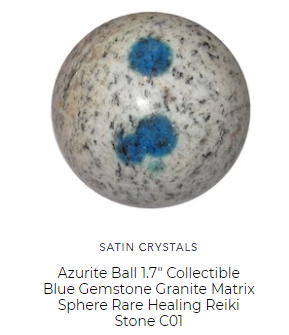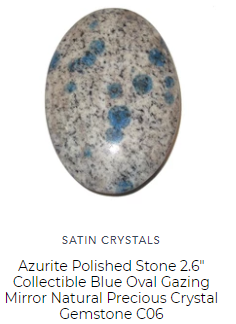Who Needs Azurite Crystals?
You may benefit from Azurite crystals if you can relate to any of the following:
- You are tiring of the materialistic world
- You want to connect with your Higher Self
- You like to relax in a meditative state
- You are attracted to deep blue colors
- You need to balance your upper chakras
What is Azurite Stone?
Azurite is a deep blue azure colored crystal. Azurite has been used since ancient times. Its name comes from an old Persian word "lazhward" that means the color Blue. Although it may occur as crystals, Azurite is usually found in its rough stone formation.
Azurite is often found in the rocks above copper ore deposits. This makes it a great marker for geologists searching for copper ore.
Azurite Jewelry
Azurite is a relatively soft and brittle stone at a 3.5 to 4 on the Mohs Scale of Hardness, so it scratches easily. It is therefore difficult to use in jewelry formation. Heating, acids and ammonia tend to change Azurite's deep blue colors, so metalsmithing the gemstone into jewelry settings or polishing it on a grinder is not easy.
Azurmalachite is a natural piece of Azurite and Malachite crystal. You will sometimes find Azurite assembled with Malachite in beads to make it sturdier. Malachite is the sturdier of the two crystals.
A newer find in the gem industry is splashes of natural blue Azurite forming on light Granite stones.

Is Azurite Rare or Common?
Along with Malachite, Azurite is one of the two copper carbonate minerals. It is more rare than Malachite though so it is more pricey. You can not find it easily. It also loses its color intensity in heat, oxygen and direct light. This makes it even harder to find fresh mineral pieces with its full azure luster.
Where is Azurite Found?
Azurite is found all over the world, but the most notable locations include Utah, Arizona and New Mexico here in the United States. It is also found in Morocco, Mexico and Australia, to name a few locations.
Azurite used to be known as Chessylite as well when thre was a famous deposit in Chessy, France, but that mine is now exhausted.
Metaphysical Properties of Azurite
Azurite is also known as the Stone of Heaven because it helps you connect to your heavenly self, also known as your Higher Self. Besides these pursuits, Azurite is also associated with the following metaphysical properties:
-
Meditate with Azurite to stimulate clairvoyance and intuition.
-
Study with Azurite on your desk to retain the information you are learning.
- Use Azurite to get beyond your shallowness and discover the depths of your true self.
What Chakra is Azurite for?
Azurite is used for opening and balancing the Third Eye and Crown Chakras. At the Third Eye Chakra, Azurite activates your sixth sense, your psychic abilities to go beyond your physical senses. At the Crown Chakra, Azurite helps connect you to the your Higher Self. This is where all of the answers lie to your life.

Azurite Mineral Facts
Azurite is known for its deep blue, but sometimes the blue is so deep that it can look black.
-
Surface Color: Blue
-
Streak Color (can vary from surface color, this is the color of the crystals’ powdered minerals): Light Blue
-
Group: Carbonates
-
Cleavage (where the crystal breaks off naturally to form a new face, parallel to its structure. This is a clean break and can cleave over and over again along the same face, retaining the crystals structure): Perfect
-
Fracture: Conchoidal (concave, like when glass breaks)
-
Luster: Vitreous (glassy)
-
Transparency: Transparent to Translucent
-
Crystal System: Monoclinic
-
Crystal Habit: Massive, Stalactitic, Tabular, Prismatic (two end faces are similar in the shape)
-
Fluorescence: None
Azurite in Granite
Unearthed from the mountains of Pakistan are Azurite gemstones embedded in Granite. We offer them in polished stones and spheres.

|
 |
The Malachite Azurite Relationship
Malachite and Azurite are often found together. Their chemical formulas are very close to each other. Malachite can also pseudo-morph into Azurite, meaning it takes over all of the blue and turns it into green, leaving just the Azurite crystal formation behind.
Azurite pigments that were used for paints commonly turn green over the years.

Lisa's Personal Experience with Azurite
I highly prefer polished stones over raw ones, especially when crystals are crafted into spheres. However, stunning blue and sparkling Azurite wins me over in its natural form. Raw Azurite retains a special shine and colors that cannot be replicated once it's polished.
There is something about the rich color that is so attractive, both aesthetically and energetically. Natural Azurite clusters seem to have shimmer that exceeds most other stones, putting the icing on the cake.
I like to use Azurite when I do Third Eye Chakra work. Lapis Lazuli is a wonderful choice for the Third Eye. It is more known and available. But when you're looking for a stunning alternative with a twist of surreal royalty, I recommend raw and sparkling Azurite.

|
Sheila's Personal Experience with Azurite
Unlike my sister, Lisa, I have always been drawn to the raw formation of crystals. I definitely agree that raw Azurite is a sight to behold. At the Third Eye Chakra, it is a radiant light into the mind and a key to unlocking intuition.
Even just the tiny raw crystals that are found in this rare stone are mesmerizing. I also love when we find AzurMalachite, the combination of the two copper ore stones in one cluster.
Magical Incantation of Azurite
This is a message from Azurite from Doreen Virtue and Judith Lukomski's book "Crystal Therapy":
"The rich hues of midnight skies are captured in my color, with sage advice lingering in my patterns. I bring the deep intuitive insight and wisdom of the feminine Divine. With me, truth is spoken, sure and strong. I won't tolerate deception, and I bring to light that which is no longer of service to you. Invite me into your life only when you're prepared to dissolve illusions and step forward into your full essence. Will you accept the transformation offered? Magician, will you walk forward and share your gifts? The world needs your healing grace this day."
Do you have an Affinity for Azurite?
What do you enjoy about Azurite? Have you used it in healing? Are you a collector of the blue stone? Tell us and we may publish it here!
You can email us directly or reach out in the contact box. We would love to hear your positive comments and questions.


